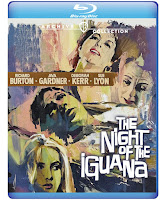the traveler's resource guide to festivals & films
a FestivalTravelNetwork.com site
part of Insider Media llc.
Film and the Arts
Isabel Leonard Enchants With Spanish Classics
- Details
- Parent Category: Film and the Arts
- Category: Reviews
- Published on Monday, 12 December 2022 15:18
- Written by Jack Angstreich

Isabel Leonard (L) and Pablo Sáinz-Villegas, photo by Lawrence Sumulong
At Alice Tully Hall at Lincoln Center, on the evening of Friday, December 9th, I had the tremendous privilege to attend a magnificent, Spanish-themed concert featuring the gorgeous mezzo-soprano, Isabel Leonard, brilliantly accompanied by classical guitarist, Pablo Sáinz-Villegas.
The first half of the program, in which the singer wore a sexy, sparkling black gown, opened stunningly with the extraordinary Seguidilla, from Georges Bizet’s Carmen,which she followed with the equally famous and indelible aria,“Voi che sapete,” from Wolfgang Amadeus Mozart’s The Marriage of Figaro. As memorable was her impossibly charming rendition of the delightful “Tu n'es pas beau, Tu n'es pas riche” from Jacques Offenbach’s decidedly underrated operetta, La Périchole: Couplets de l'aveu. Less commonly heard was the beautiful Canzonetta Spagnuola of Gioachino Rossini. Sáinz-Villegas then returned to the stage alone for a mesmerizing performance of the haunting Recuerdos de la Alhambra of 1899, one of the most celebrated works for solo classical guitar. Less tuneful and more austere than what preceded, but nonetheless powerful, were Leonard’s five arresting selections from Siete canciones populares españolas of 1914 by Manuel De Falla, probably the greatest modern Spanish composer: “El paño moruno,” “Asturiana,” “Nana,” “Canción,” and “Polo.” (She has recorded the entire set of songs twice.) In a program note for the La Jolla Music Society, Eric Bromberger commented that “In arranging the collection of songs, Falla took the unaccompanied melodic line of seven Spanish popular or folk songs and harmonized them himself, occasionally rewriting or expanding the original melodic line to suit his own purposes.”
After intermission, Sáinz-Villegas opened the second half of the event by masterfully playing an arrangement for solo guitar of Isaac Albeniz’s marvelous Asturias from his Suite espagnole of 1889, one of the most renowned works in the Spanish repertoire. Leonard then returned to the stage—she wore a fabulous, shimmering gold gown designed by Naeem Khan—to compellingly perform a another seldom heard but nonetheless remarkable selection of the Canciones Españolas Antiguas of the revered poet, Federico García-Lorca (who according to Bromberger, collected, arranged, and harmonized the twelve Spanish folk songs that constitute the set): “La Tarara,” “Nana de Sevilla,” and “Sevillanas del s. XVIII.” (She has recorded these as well.)
The remainder of the program was in a more popular idiom, beginning with Sáinz-Villegas enjoyably playing Tango en Skäi by French composer Roland Dyens. Leonard’s Argentine heritage was reflected in her choice of another exquisite tango,“El día que me quieras,” by the most renowned practitioner of the form, Carlos Gardel—a song which she performed unforgettably. The next song— the basis of which was another Latin-American dance-form, the zamba—was the classic “Alfonsina y el Mar” by Ariel Ramírez, with lyrics by Félix Luna, written as a tribute to the eminent Argentine poetess, Alfonsina Storni. The program concluded wonderfully with a pleasurable bolero, the 1959 “Sabor a mí,” by Mexican composer Álvaro Carrillo.
Enthusiastic applause was rewarded with three sterling encores, starting with the enormously popular, enchanting bolero,“Bésame mucho,” by Consuelo Velázquez. However, nothing in the evening could surpass the sublimity of Leonard’s rendition of the “Habanera” from Carmen.Finally, she winningly sang the bewitching, familiar “Cielito Lindo” by Quirino Mendoza y Cortés, joyfully ending a fantastic encounter.
December '22 Digital Week I
- Details
- Parent Category: Film and the Arts
- Category: Reviews
- Published on Wednesday, 07 December 2022 21:16
- Written by Kevin Filipski
A Sentimental Evening With Audra McDonald
- Details
- Parent Category: Film and the Arts
- Category: Reviews
- Published on Wednesday, 07 December 2022 15:00
- Written by Jack Angstreich

Audra McDonald on stage, photo by Chris Lee
At Carnegie Hall, on the evening of Saturday, December 3rd, I had the enormous privilege to attend a terrific concert—entitled “Feeling Sentimental”—featuring the fabulous Broadway musical star, Audra McDonald—who first performed at this venue in 1998—looking glamorous in a stunning red gown. She was accompanied by a full orchestra under the admirable direction of Andy Einhorn—in his conducting debut at this hall—along with pianist Jeremy Jordan, drummer Gene Lewin, and Mark Vanderpoel on bass.
McDonald opened the program with Jerry Herman’s "I Am What I Am" from his 1983 show La Cage aux Folles, in honor of the victims of the recent mass shooting in Colorado. She followed this with another lovely song, “Pure Imagination,” by Leslie Bricusse and Anthony Newley, from the 1971 film, Willy Wonka & the Chocolate Factory, where it was unforgettably delivered by Gene Wilder. Her next song was one of the highlights of the evening, the glorious "(When I Marry) Mister Snow" from Carousel, the classic musical from 1945 by Richard Rodgers and Oscar Hammerstein II—she appeared as Carrie Pipperidge to great acclaim in Nicholas Hytner’s highly regarded Lincoln Center production of 1994. She then performed “Cornet Man,” a lesser-known song by Jules Styne—with lyrics by Bob Merrill—from 1964’s Funny Girl. As a tribute to the wonderful Diahann Carroll, she sang “A Sleepin' Bee” by Harold Arlen with lyrics by Truman Capote, from their 1954 show, House of Flowers. Her next item, “Moonshine Lullaby” from Irving Berlin’s Annie Get Your Gun of 1964, is also less commonly heard. Another summit in the proceedings was attained with the next two songs: first, as a tribute to the incomparable Barbara Cook, the magnificent “Will He Like Me?" by Jerry Bock and Sheldon Harnick from their extraordinary 1963 musical She Loves Me and, second, “Summertime” from George Gershwin’s 1935 opera, Porgy and Bess, with lyrics by DuBose Heyward. She closed the first half of the event with the famous “Rose’s Turn” from Styne’s Gypsy of 1959, with lyrics by Stephen Sondheim.
After intermission, McDonald returned to the stage to perform “Gorgeous’’ from Bock and Harnick’s 1966 The Apple Tree. Her rendition of Duke Ellington’s “(In My) Solitude” from 1934 ensued, followed by a tribute to Leslie Uggams: “Being Good Isn't Good Enough” from Styne’s 1967 musical, Hallelujah, Baby!, with lyrics by Betty Comden and Adolph Green and a book by Arthur Laurents. She then sang “Bein' Green”—from 1970—by Joe Raposo, which was memorably recorded by Frank Sinatra. After this she did a mashup of “You've Got to Be Carefully Taught” from Rodgers and Hammerstein’s 1949 South Pacific and “Children Will Listen” from Sondheim’s 1987 Into the Woods. This was succeeded by “Can’t stop talkin’” by Frank Loesser from the 1950 film, Let’s Dance. Herman’s exquisite "Before the Parade Passes By" from his 1964 Hello, Dolly! followed, and she then excellently performed another fine song, Sondheim’s “With So Little to Be Sure Of “ from his 1964 musical, Anyone Can Whistle, also with a book by Laurents. She ended her set with another classic—“Cabaret” from the 1966 show of the same name by John Kander and Fred Ebb—which she originally sung for a benefit at the behest of Vogue editor, Anna Wintour. As a response to the ardent applause, she delighted her audience with two encores. She first performed “Home” from the 1972 musical, The Wiz, after which Einhorn joined her to reproduce the marvelous duet between Barbra Streisand and Judy Garland from the 1960s on the latter’s weekly television show on which they sang “Happy Days Are Here Again” and the Arlen “Get Happy,” introduced by Ruth Etting in 1930.
"Midsummer" in Winter with the Orchestra of St. Luke’s
- Details
- Parent Category: Film and the Arts
- Category: Reviews
- Published on Monday, 05 December 2022 20:37
- Written by Jack Angstreich

David Hyde-Pierce with the Orchestra of St. Luke’s, photo by Chris Lee
At Carnegie Hall, on the evening of Thursday, November 17th, I had the great fortune to attend a terrific concert featuring the superb Orchestra of St. Luke’s under the estimable direction of Harry Bicket.
The event opened exhilaratingly with a dazzling performance of Felix Mendelssohn’s pleasurable Piano Concerto No. 1, with the extraordinary soloist, Benjamin Grosvenor. The first movement opens in bravura fashion, and after the introduction of the exquisite, song-like second theme, it becomes the model of the virtuoso Romantic concerto. The delicate Andante that follows is the most beautiful of the three movements while the propulsive, playful finale is astonishing too in its way. Grosvenor stunned with an amazing encore: "Gnomenreigen" from Two Concert Etudes by Franz Liszt.
But it was the balance of the program that was especially memorable: a magnificent account of Felix Mendelssohn’s marvelous Overture and Incidental Music to A Midsummer Night’s Dream, featuring David Hyde-Pierce as narrator. The celebrated Overture is of course enchanting and was followed by the sprightly, charming Scherzo. The song “Young spotted snakes”—an instance of heavenly vocal writing—was gloriously sung by the lovely soprano Elena Villalón, mezzo-soprano Cecelia Hall, and the wonderful Choir of Trinity Wall Street. The effectively suspenseful Intermezzo was succeeded by the majestic Notturno, while the inordinately familiar Wedding March was nonetheless stirring and exultant, preceding the delightful song, “Through the house give glimmering light,” which proved to be a gorgeous conclusion.
This outstanding ensemble returns to this venue on February 9th, 2023 with Franz Schubert’s unforgettable Ninth Symphony and on April 13th, 2023 with a program devoted to Georg Friedrich Händel, including the fabulous Royal Fireworks Music.
More Articles...
Newsletter Sign Up

















